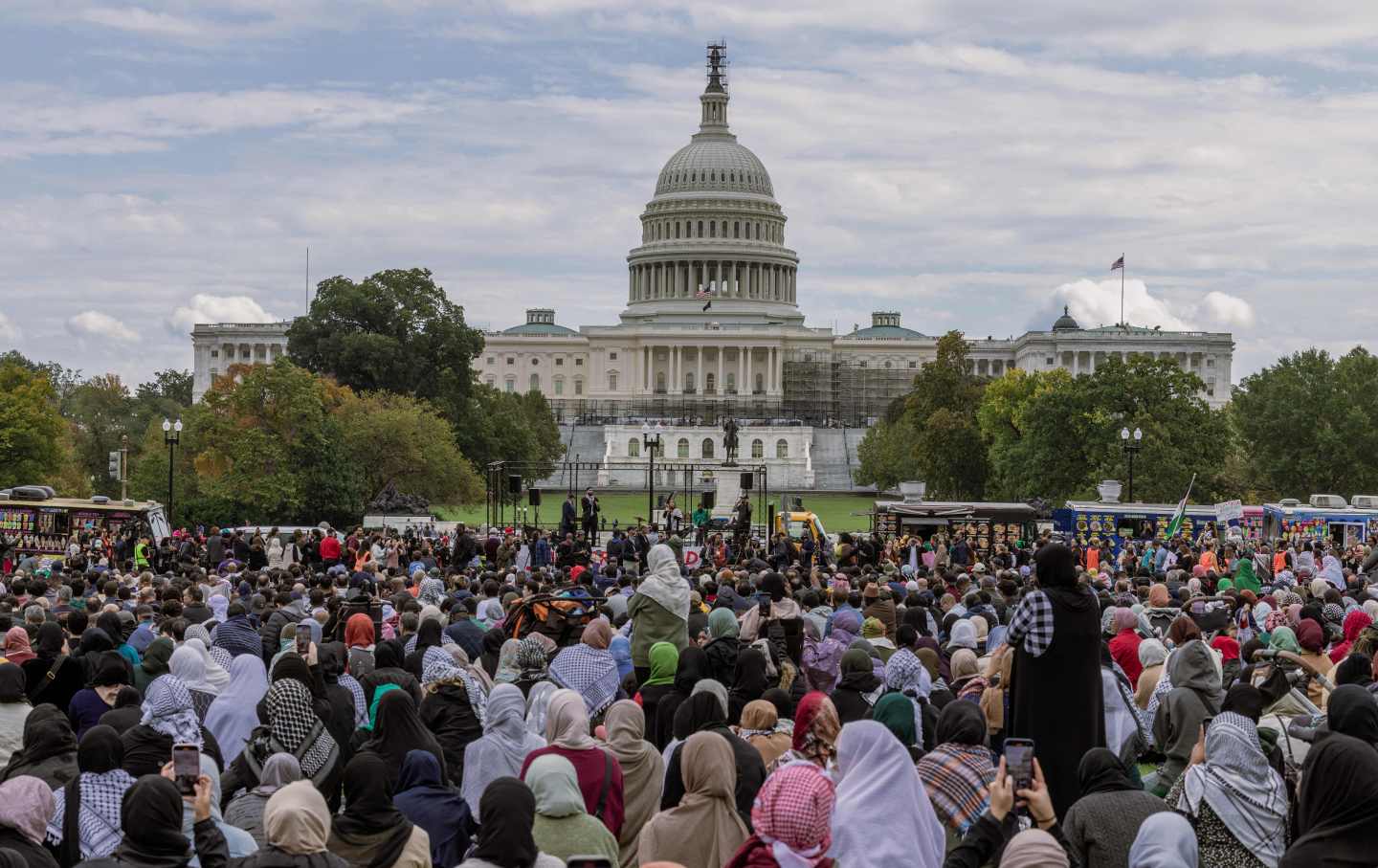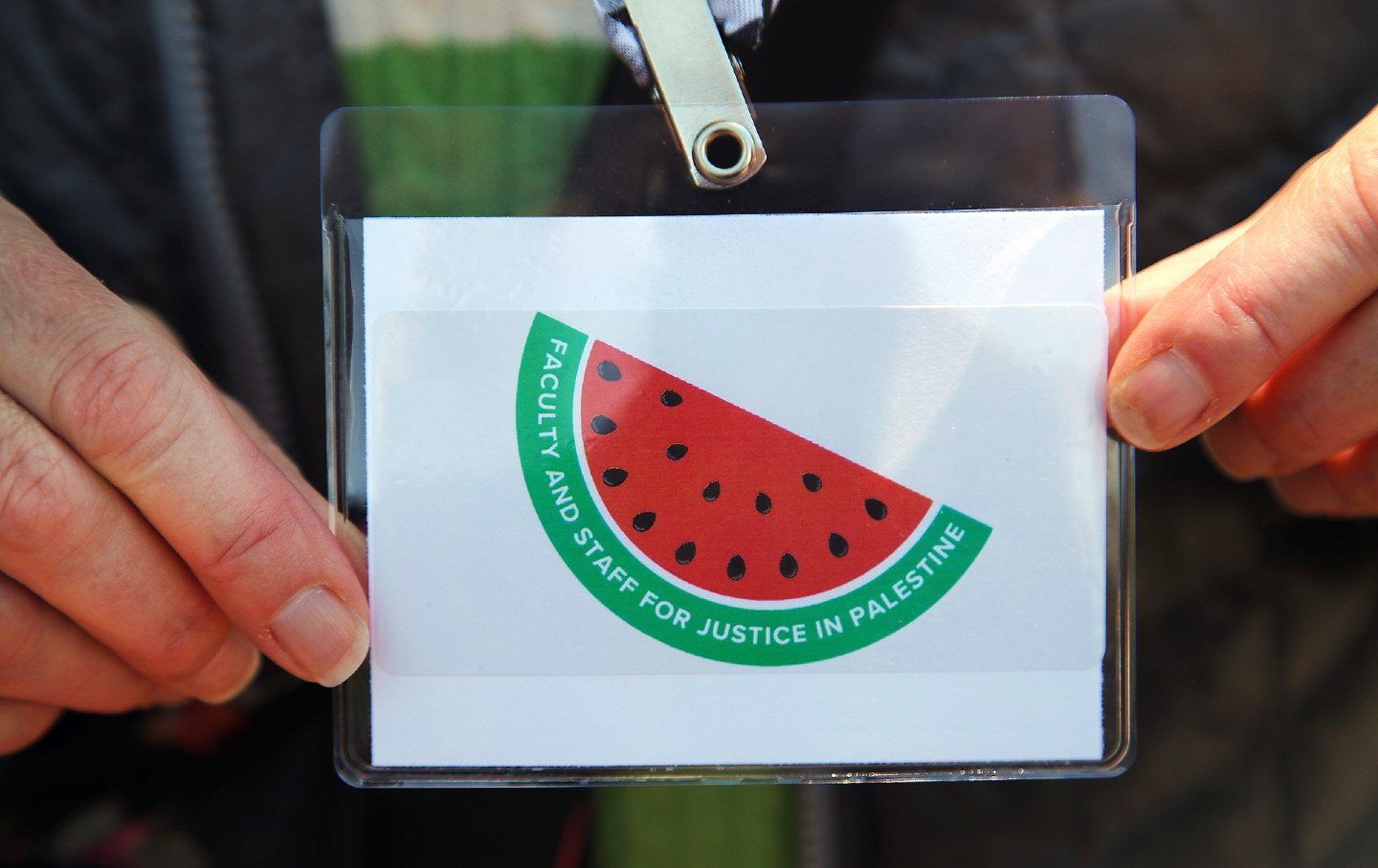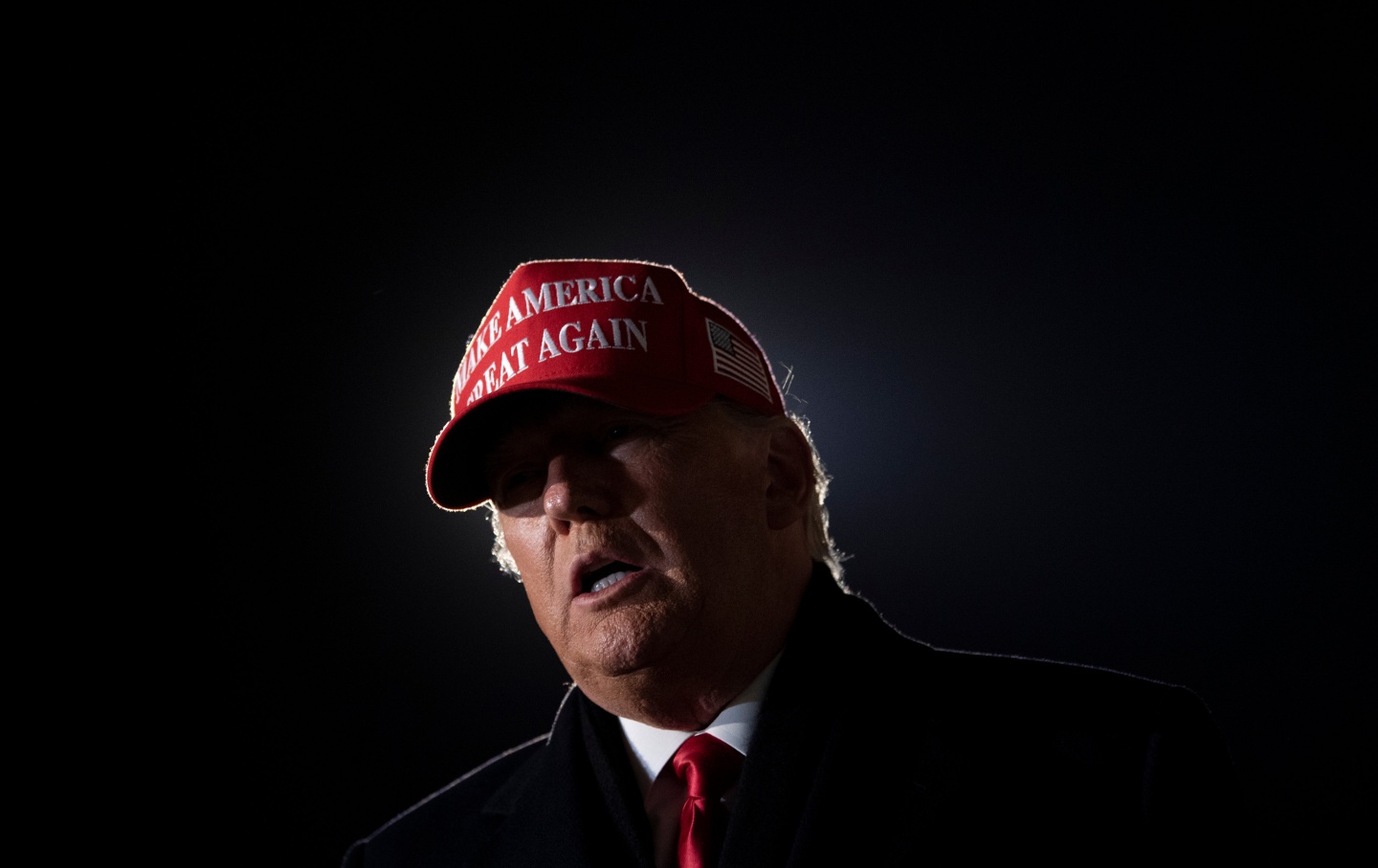Muslim Americans Are Facing a Brutal Wave of Islamophobia
Violence against Muslim and Arab Americans has exploded since October 7. Some say things are almost worse than they were after 9/11.

Muslims gather for Friday prayers in front of the Capitol in Washington, D.C., and take part in a demonstration to express their solidarity with the Palestinian people on October 20, 2023.
(Ali Khaligh / Middle East Images / AFP via Getty Images))Sara Masoud, a Palestinian-American assistant professor living in San Antonio, remembers Sunday, October 8 as a day of horror. The day prior, Israeli Prime Minister Benjamin Netanyahu vowed to turn the Gaza Strip into a “city of ruins” in response to the brutal attacks carried out inside Israel by Hamas.
Masoud organized an emergency rally outside of the San Antonio Federal Courthouse in support of the people of Gaza. Around 100 people showed up. But while Masoud was giving a speech at the rally, she found her own life was in danger.
“As soon as I got on the megaphone and started chanting, these two large white men with Israeli flags draped around their backs, one with a baseball bat in his hand and a handgun strapped to his waist, come straight towards me and start yelling slurs and shouting at us to leave,” Masoud remembers.
“They called us terrorists, idiots, told us to leave the country and more and more. They kept getting closer and closer to me and tried to pull my face mask off and yelled, ‘Who are you trying to hide from?’ The man looked like he was about to hit me with his baseball bat. Eventually a group of guys pushed them down to the ground after they kept on trying to grab other people at the rally. The cops… watched passively from a distance and then offered support to the two men who were pushed to the ground. They didn’t do anything to protect us. They escorted the attacking men down the street.”
Masoud’s experience with violent anti-Palestinian racism and Islamophobia didn’t exist in isolation. The Federal Bureau of Investigation made a public service announcement on Wednesday, October 25, that it “has seen an increase in reports of threats against Jewish, Muslim, and Arab communities and institutions.” Corey Saylor, director of research and advocacy at the Council on American-Islamic Relations (CAIR), tells The Nation that his organization has witnessed a “massive influx” of reported anti-Arab and anti-Muslim hate attacks: over 1,200 in the first month since October 7, a 216 percent increase from the same period in 2022.
Also in San Antonio, on Wednesday, October 25, a hijabi doctor had rocks and stones pelted at her car while a white man yelled Islamophobic slurs at her. The incident occurred in a neighborhood where she and her family had lived safely for more than twenty years.
On Sunday, October 22, a 39-year-old white man fired a gun at a pro-Palestine rally in Skokie, Ill. On the same day, 33-year-old Zevulen Ebert was charged with a hate crime after he pepper-sprayed pro-Palestinian protesters and police in Skokie while shouting accusations about Palestinians killing babies. Two more Illinois incidents were reported in Bridgeview and Lombard.
And that was in just one state. The list of incidents encompasses the whole country: Cleveland, where a Palestinian-American man was walking home from lunch when he was intentionally hit by a driver who shouted “Kill all Palestinians”; Brooklyn, where a man carrying a Palestinian flag was attacked; Queens, Manhattan, and on the Brooklyn Bridge; Eugene, Ore.; Salt Lake City, Utah; Minneapolis, Minn.; Stanford University, Calif.; Toledo, Ohio; and on and on and on.
In the most horrifying incident, 6-year-old Wadea Al Fayoume was stabbed to death twenty-six times in Plainfield Township, Ill., by his family’s landlord, 71-year-old Joseph Czuba, who shouted anti-Muslim rhetoric as he murdered the child. Al Fayoume’s mother, who was also stabbed, survived.
CAIR suffered a bomb threat against a fundraising dinner originally planned for Saturday, October 22, at the Crystal Gateway Marriott in Arlington, Virginia. The hotel canceled the event, and CAIR moved the dinner to a local mosque.
“We had several off-duty police officers and armed police, a private contracted security force, also armed, and one of our speakers had their own security detail,” Saylor says. “We did not give away the new location to the public. We vetted every single person registered for the banquet, only allowing those known to us or who have attended our events in the past. We looked at each of their social media and then called them to ensure they were real human beings. Then only did they receive the address.”
Saylor says that the current climate is unprecedented.
“I’ve been doing this work for more than 30 years. I remember after 9/11, sitting in my CAIR building, staring at the many police cars outside our building after we started to receive violent threats. I remember, in 2009, standing outside of the CAIR building giving a press conference after we received threats following the Fort Hood shooting, but never in my life have I witnessed what we are [seeing] today. I’ve never had to bring more than 15 armed people to guard my event,” he says.
From 2000 to 2009, hate crimes against Muslims spiked by over 500 percent, pushing Muslims and those who could be perceived as Muslim to be extremely vigilant. Masoud, who immigrated with her family from Burqa, Nablus, to El Paso, Tex,, in 2000, remembers that time clearly—and says it is happening again.
“After 9/11 happened, my parents instructed me to identify as white and not speak Arabic in public,” Masoud says. “Somebody in our community made a bomb threat to the mosque I attended for Sunday school and it never made the news. My parents made the decision to homeschool me for middle school because of the ways kids were bullying Arabs. A lot of what we’re seeing today is so deeply aligned with that experience and it’s bringing out my scared inner child.”
Yet Masoud describes this recent major uptick in violent Islamophobic and anti-Arab attacks as “almost worse than [after] 9/11.” She has always had pro-Palestinian bumper stickers attached to her car, but in recent weeks, has been flipped off by other drivers several times and another vehicle once attempted to violently drive her off the road.
Popular
“swipe left below to view more authors”Swipe →In January 2017, when former president Donald Trump signed the executive order to ban many Muslims abroad from entering America, Muslims already in America also experienced a major uptick in violent Islamophobia. Rana Abdelhamid, founder and executive director of Malikah, a grassroots organization that advocates against gender and hate-based violence and leads self-defense training for marginalized communities, notices a major difference in the concern for Muslim and Arab communities now.
“[In 2017], there was this sense that Democrats and the left were in some ways driven by empathy and there were these cohesive moments of solidarity, but that doesn’t feel like this moment,” Abdelhamid says.
“Muslims, Arabs, Palestinians are all currently vilified within Democratic spaces as well…and you see this show up in media headlines, public political statements, and on both sides of the aisle. You don’t see empathy or grief for Palestinian lives, but dehumanization. As someone who’s done hate-based violence work, research shows that hatred like this is specifically tied to political rhetoric. When that political rhetoric is coming from everywhere, that obviously increases the level of violence and that’s exactly why our communities are feeling this violence right now.”
Muslims, Arabs, and those who could be perceived as a part of either community are now again enacting lifestyle changes to increase their safety, including removing hijabs and religious jewelry, refraining from speaking non-English languages in public, and even being careful about large Muslim gatherings like Friday prayers at mosques.
When thinking about physical safety, Abdelhamid says, “We center what people can do to make themselves feel the most safe, what will make them feel physically OK. and this looks different for everyone. For example, if you don’t feel comfortable taking public transportation alone, then that might look like traveling with groups or taking Ubers. If you are feeling unsafe because of what someone’s reaction might be to your political stance, then maybe you don’t engage verbally, because it might escalate into something physical. And so, centering people’s physical well-being is the primary concern and that can be anything from changing your physical appearance to traveling in groups.”
In the midst of this heightened vulnerability, Abdelhamid, Masoud, and Saylor have all witnessed their communities come together to keep each other safe. Masoud says that she’s actually been wearing her Palestinian keffiyeh more often in public spaces and at work to build solidarity.
Abdelhamid has found it cathartic and comforting to attend community prayers, vigils, and protests, but also feels protected by the solidarity built between her own community and those experiencing similar grief. “I’ve been very privileged and lucky to have community in relationship with a lot of Jewish people who also have extended their hand,” she says. “There’s been a mutual space of processing that we have cultivated around safety as well. The spike in antisemitism and anti-Muslim violence unites us and builds a better solidarity between us. I’m also looking at the Sikh community affected by violence too and finding solidarity there.”
On November 1, President Joe Biden and Vice President Kamala Harris announced the nation’s “first-ever US National Strategy to Counter Islamophobia in the United States.” The announcement was met with extreme skepticism, with many arguing that the White House had helped create the conditions for rampant Islamophobia in America. Others pointed out that the strategy could increase police surveillance on Muslim American communities who have already been experiencing heightened surveillance and random FBI visits since October 7. Following the White House’s announcement of its new strategy, CAIR released a statement that “the first and most important step” to combat the surging Islamophobia in the United States is for President Biden to “demand a ceasefire in #Gaza.” The statement directly linked the violent trends in the United States to the “dehumanizing, racist, & Islamophobic rhetoric” being used by the Israeli and United States governments.
Saylor, who has been regularly meeting with and advocating for Muslims affected by violent Islamophobia on behalf of CAIR, says to those hurting to turn to each other for help.
“Research shows that human beings in crisis look at each other to see how everyone else is responding,” he says. It is incumbent on each of us to remember that. Look to each other, have strength, and take care of your community. Our cause is just and our community is strong.”
If you or someone you know has been threatened by Islamophobia or related identity-based violence, you can seek support at Islamophobia.org
We cannot back down
We now confront a second Trump presidency.
There’s not a moment to lose. We must harness our fears, our grief, and yes, our anger, to resist the dangerous policies Donald Trump will unleash on our country. We rededicate ourselves to our role as journalists and writers of principle and conscience.
Today, we also steel ourselves for the fight ahead. It will demand a fearless spirit, an informed mind, wise analysis, and humane resistance. We face the enactment of Project 2025, a far-right supreme court, political authoritarianism, increasing inequality and record homelessness, a looming climate crisis, and conflicts abroad. The Nation will expose and propose, nurture investigative reporting, and stand together as a community to keep hope and possibility alive. The Nation’s work will continue—as it has in good and not-so-good times—to develop alternative ideas and visions, to deepen our mission of truth-telling and deep reporting, and to further solidarity in a nation divided.
Armed with a remarkable 160 years of bold, independent journalism, our mandate today remains the same as when abolitionists first founded The Nation—to uphold the principles of democracy and freedom, serve as a beacon through the darkest days of resistance, and to envision and struggle for a brighter future.
The day is dark, the forces arrayed are tenacious, but as the late Nation editorial board member Toni Morrison wrote “No! This is precisely the time when artists go to work. There is no time for despair, no place for self-pity, no need for silence, no room for fear. We speak, we write, we do language. That is how civilizations heal.”
I urge you to stand with The Nation and donate today.
Onwards,
Katrina vanden Heuvel
Editorial Director and Publisher, The Nation
More from The Nation

Sundays With Noel Sundays With Noel
Noel Parmentel was, according to his former lover and mentee, Joan Didion, the ‘outsider who lived by his ability to manipulate the inside.’

Bosses Are Retaliating Against Workers for Showing Solidarity With Palestinians Bosses Are Retaliating Against Workers for Showing Solidarity With Palestinians
Workers are losing their jobs and professional opportunities for expressing pro-Palestinian sentiment. Others are choosing to self-censor amid a climate of fear.

When It Comes to Public Health, We Need to Tap Into People, Not Pundits When It Comes to Public Health, We Need to Tap Into People, Not Pundits
The future of our health under Trump is going to be bleak. But the solution lies in our communities, not individual personalities.

Mr. Scarborough Goes to Mar-a-Lago Mr. Scarborough Goes to Mar-a-Lago
The hosts of Joe Biden’s favorite political talk show have quickly pivoted to kissing the ring of the incoming president.

Watching a Parallel Media Try to Make Trump the Big Sports Story Watching a Parallel Media Try to Make Trump the Big Sports Story
The president-elect did not dominate the world of sports this weekend, but Fox News and Internet tabloids are inventing new realities.

The First Amendment Will Suffer Under Trump The First Amendment Will Suffer Under Trump
Given what’s heading our way, we need a capacious view and robust defense of the First Amendment from all quarters.


